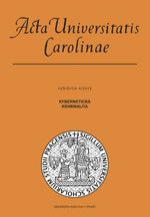Současné problémy výzkumu romského etnika v českých zemích
Contemporary Issues of the Research into the Roma Ethnicity in the Czech Lands
Author(s): Nina PavelčíkováSubject(s): Law, Constitution, Jurisprudence
Published by: Univerzita Karlova v Praze, Nakladatelství Karolinum
Keywords: nation; national minority; ethnic minority; Gypsies; multiculturalism; culture; identity; legal status; discourse; practice
Summary/Abstract: The paper deals with several methodological and substantive issues of researching into the history and culture of Roma ethnic groups; the author argues that these issues are relevant in a wider context of the NAKI project entitled “The issues of the legal position of minorities in practice and their longterm development”. The author points at the fact that the research into Roma groups has been a relatively new discipline; as a result, it has been subject to many debates and seen from various perspectives. She mentions the discourse between the representatives of a “traditional” conception of Roma people as a uniform community (ethnic or sub-ethnic group) and the representative of cultural anthropology (both foreign and Czech). There is a newly emerged opinion, which is commonly accepted today, that Roma people are composed of heterogeneous groups whose members do not share the feeling of co-existence and national identity. Therefor they cannot represent members of one uniform nation, as is usually claimed by various Roma representatives and activists particularly within the International Romani Union. In this context, the author refers to the analysis of a national identity made by outstanding Czech historian M. Hroch. This issue is relating, to a certain extent, to the recent debate over the name of this ethnic group (Gypsies/Roma/ Romani); the author claims that experts have not come to any acceptable conclusion yet. The final part of the paper brings in certain observations of the recent development of the relationship between the majority and most “foreign” cultures including the culture of Roma groups. Regretfully, considerations regarding mutual enrichment of cultures have not been confirmed; on the contrary, misunderstanding, or the lack of understanding, each other has deepened along with malice and other negative phenomena supporting various long-lasting stereotypes. As a result, an interest in acquiring a deeper knowledge of the Roma culture has been declining, as the author points out in relation to certain practical outcomes of the planned project.
Journal: Acta Universitatis Carolinae Iuridica
- Issue Year: 59/2013
- Issue No: 1
- Page Range: 133-146
- Page Count: 14
- Language: Czech

